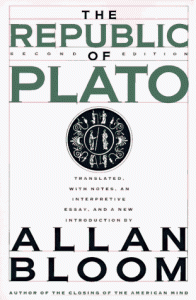Today I read Plato’s Republic while, uh, waiting for code to compile.
Previously, Izabella Kaminska pointed out that Bitcoin’s governance has analogues in anacyclosis, the ancient Greek theory of political evolution. Anacyclosis is a progression from Monarchy to Kingship to Tyranny to Aristocracy to Oligarchy to Democracy to Mob Rule.
Bitcoin is now at a political impasse as the core developers jockey for power under the guise of a technology debate.
According to Plato, the ideal (maximum justice) city is ruled by an all-knowing philosopher king. In ancient Greece, philosophers were physicists who came up with mathematical formulae to explain the universe, not the deadbeats we think of today.
Because the king wholly understands the universe, he is most fit to govern. This is an aristocracy, literally “rule of the best”. In Plato’s world, Stephen Hawking would be king.
The rulers have no possessions because they only desire knowledge. Over time, mistakes are made in choosing successors, and less altruistic people rise to power. They allow themselves some wealth as reward for their knowledge-seeking virtues.
This eventually decays into oligarchy. The rich and powerful want to preserve their wealth so they restrict poor people from political influence. The rulers are afraid of the people, and the people hate the rulers.
Finally, the poor people revolt, kill the wealthy, and install a democracy.
Even in a democracy, there will be a natural wealth gap. This is okay until the poor people start thinking that the rich are in fact oligarchs. Tension builds until someone leads the underclass to revolt. Charles Manson was trying to trigger this underclass revolution with his Helter Skelter murders in the 60s.
Plato foresaw that the leader of the revolution would turn the city into a tyranny. He did not predict that the tyrant would be Charles Manson.
Bitcoin started with Satoshi Nakamoto as philosopher king. The five core developers constitute an aristocracy. However, the true power lies with the mining pools in China and Iceland, who provide over 70% of the Bitcoin hashing power. The Chinese ASIC miners don’t care about the ongoing squabble because their hashing power puts them light years ahead no matter who controls the core.
If Bitcoin politics mirror Greek philosophy, we’re in for a revolution. We will abandon Bitcoin and adopt a more democratic protocol like Ethereum. Ethereum’s mining function is memory-bound, meaning computation speed is limited by memory access. Custom hardware has less advantage because you can only put so much memory in silicon.
When even Ethereum fails to provide justice, then maybe we will adopt the tyranny of the US dollar.
References:
1. Plato. The Republic. 360 B.C. –The Internet Classics Archive
This translation reads like a bad Tom Stoppard play. But maybe that’s just Plato
2. Bitcoin in the Headlines: Fork-load of Drama –coindesk
3. I thought this was a helpful interpretation:


One thought on “Plato’s Republic and the Bitcoin Civil War”